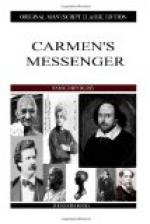He must find Daly and thought it significant that the fellow’s attempt at extortion had not been very determined. If Featherstone was right about this, it indicated that Daly suspected that Lawrence was beyond his reach and had not been at the Garth. It was possible that he had found out how he had been misled and meant to look for his victim in Canada. Foster wondered whether he would go without his money, or if he had received a share of the plunder before, since the circular check was not for a large sum. In any case, it was lucky that Daly had visited the Garth when he did, because if he had waited another day, he might have met Graham, which would have been awkward.
After some thought, Foster decided to act on the supposition that Daly would return to Canada. Then, dismissing the matter for the time, he speculated about the possibility of Graham’s lurking in the neighborhood and began to look ahead. A stone dyke, broken in places, ran between the winding road and the stream it followed; on the other side, which lay in shadow, thin birches straggled up a steep hill. The moon was low and would soon sink behind the trees, when it would be very dark. When he looked back he could not see the lights of the Garth. He was on the road to the station, and remembered that there was a train from the south in the evening.
Taking out his watch, he calculated that anybody who left the station on foot when the train arrived might be expected to reach the Garth in the next quarter of an hour. This was disturbing, but he saw nothing to cause him alarm as he went on. Now and then a rabbit, startled by his footsteps, ran across the road, and once or twice an owl hooted as it fluttered overhead. The river splashed among the stones and sometimes the shadows moved as a puff of wind came up the valley; but that was all. Still Foster quickened his pace; it was some distance to the village where he knew of an inn, and he wanted to get there before the people went to bed. He would not admit that he shrank from being left in the dark when the moon sank.
By and by Pete stopped to relight his pipe and uttered an exclamation when he put his hand in his pocket.
“I hae lost the guid pooch ye gave me at Hexham,” he said. “I mind I filled my pipe by the big thorn where the wire fence stops, and the moon’s on the road. If ye’ll bide or gang on slowly, I’ll rin back.”
“Never mind it. I’ll give you another.”
“Na,” said Pete. “If ye had been used with an auld tin and had a smairt pooch for the first time, ye wouldna’ lea’ it in the road. Besides, it was fu’ o’ a better tobacco than I often smoke.”
Foster would sooner have kept him, but was unwilling to admit that he did not like to be alone. It was not very far to the thorn tree and Pete would soon overtake him. He went on, but did not loiter, and noted how his footsteps echoed along the edge of a wood ahead. In fact, the noise he made rather jarred his nerves, but the grass by the roadside was hummocky and wet. The road was dark beside the wood, for the moon was near the tops of the black firs, but there were gaps through which the silver light shone down.




